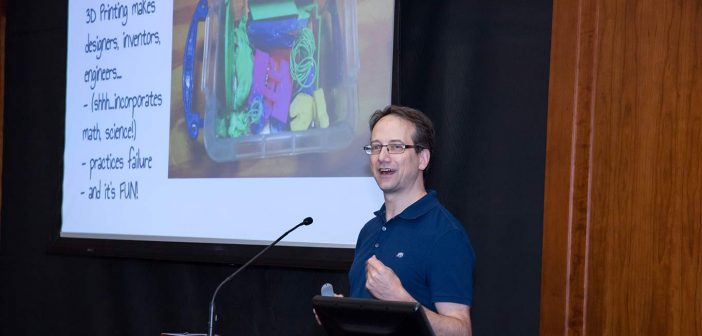Jonathan Rochelle, the co-founder of Google Docs, said teachers should be inspiring their students to be ready for jobs that don’t exist yet.
In his July 22 keynote speech, “You Should be Innovating,” Rochelle mixed anecdotes about his children with discussion on the creation of Google Classroom and other platforms that seek to teach innovation. He spoke at the Graduate School of Education’s second annual Developing Digital Literacies conference at the Lincoln Center campus.
“I believe teachers should model innovation so that students understand it, accept it, and value it,” he said. He offered an “innovation rubric for teachers:” creativity, optimism, passion, decisiveness, experimentation, collaboration, acceptance of failure, communication, and research.
A recent convert to the teaching value of 3D printing, Rochelle said the act of physically making something is very important to learning how to innovate.
“In the creation process, sure, there may be something that you call ‘failure,’ but there really is no failure when you’re creating,” he said.
And it doesn’t matter what you create, he said, noting that he keeps a “box of failures” from his own 3D printing experiments.
Optimism, he said, is a skill that can be learned, in order to resist the temptation to say something won’t work. At one point in history, bottled water was probably deemed a stupid idea, he said. At Google, self-driving cars were likewise frowned on, initially.
Value Ideas
“Practice by getting your kids together and saying ‘Let’s come up with crazy ideas.’ And the thing you’re practicing is, when someone comes up with the worst idea, and another kid says ‘Oh that’s so stupid,’ that’s when you stop and say ‘You don’t know if it’s stupid or not, and we don’t care. It’s an idea,’” he said.
“You want to practice getting all the great ideas out there—and you don’t know which ones are great until you keep going.”
Being decisive is a big part of the equation too, because even if you screw up, you’ll know which way will be the right direction next time, he said. And while the failure can also be beneficial, he cautioned that it’s crucial to explain the difference between failure in assessment and failure in practice, and in trying and experimenting. It’s not ok to fail a test, for instance.
Rochelle brought his own family into the lecture when he addressed the topic of passion. His son Jeremy was so enamored with trucks, he said, that for his 13th birthday Rochelle rented him a small backhoe and let him dig holes in their back yard.
“The key is about discovery. Help the kids discover what they’re going to be passionate about. They don’t know and they need to be introduced to as many things as possible,” he said.
“What you [teachers]do changes the world. It’s critical that the kids understand and get a feeling for what they want to do, and modeling that and understanding it requires innovation.”
The GSE’s Digital Literacies Collaborative organized the conference.



